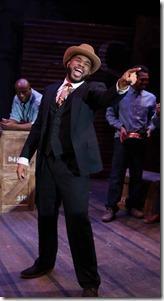
Riveting dissonance permeates every minute of powerful production
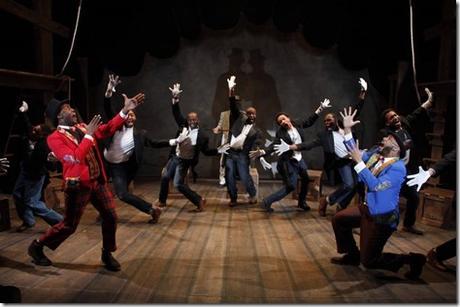
Review by Catey Sullivan
About a third of the way into Porchlight Music Theatre's riveting staging of The Scottsboro Boys , there's a song that captures the sorrow of the world. "Go Back Home" is a lament sung with aching sadness and impossible beauty by the titular "boys," nine African-Americans who have been charged with raping two white women. The setting is 1931 Alabama, and it's crystal clear that even though the alleged rapes never occurred, the "boys" will be lynched, with or without the benefit of a trial.
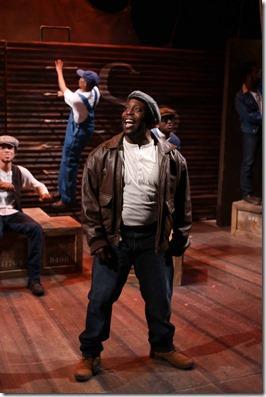
Goode plays Eugene Williams, who was 12 when he was charged (along with the others) with rape and sentenced to die in the electric chair. It's in his character that the irreversible tragedy of The Scottsboro Boys is distilled. Goode personifies innocence doomed, and everything that is so staggeringly wrong with a world where a child's skin color can literally be their death warrant. Once you hear Goode-as-Eugene singing, you'll be watching him for the rest of the show.
Directed by Samuel G. Roberson, Jr., The Scottsboro Boys is powerful throughout. Penned by Fred Kander and (music and lyrics) and David Thompson (book), the piece has the trappings of a raucous farce and minstrel show. A slick Interlocutor with a voice like magnolia syrup (Larry Yando) introduces Mr. Bones (Denzel Tsopnang) and Mr. Tambo (Mark J. P. Hood), a pair of shucking, jiving buffoons who embody the racism that defines minstrelsy. These three will serve as our guides through a judicial system that's as preposterous as the antics of Mr. Tambo and Mr. Bones, but far more lethal.
The story of the nine young men of The Scottsboro Boys is an indelible black mark on U.S. history. Twelve-year-old Eugene Williams along with teenagers Olen Montgomery (Travis Austin Wright), brothers Roy and Andy Wright (Jerome Riley Jr. and Maurice Randle), Haywood Patterson (James Earl Jones II), Clarence Norris (Stephen Allen Jr.), Willie Roberson (Izaiah Harris), Ozie Powell (Trequon Tate) and Charles Weems(Jos. N. Banks) all wound up on the same freight train in 1931. Except for the brothers, they had never met each other before that fateful ride. Long before they made it to Chattanooga where they hoped work might be waiting, the nine were hauled off the train and charged with raping a pair of white prostitutes, Victoria Price and Ruby Bates.
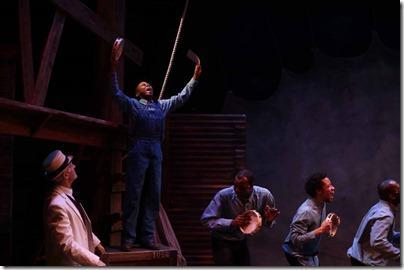
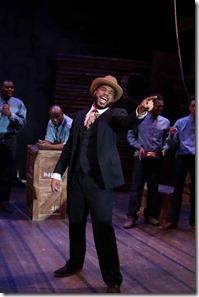
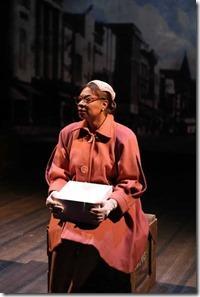
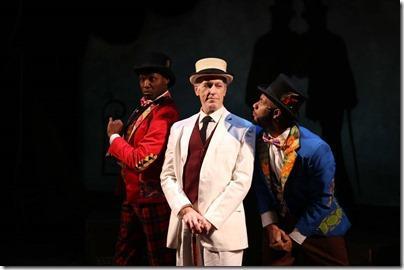
Historians say Price and Bates made the accusations in order to avoid being arrested themselves. Instead of being seen as no-good harlots, Bates and Price became emblems of southern womanhood, delicate lilies who had been brutally attacked by beasts. The Scottsboro nine didn't stand a chance, not in an era when extra-judicial lynchings were cause for parties and picnics where the fingers and genitals of lynched men were sold as souvenirs.
The musical is filled with surprises even if you already know the outcome of the Scottsboro trials. When projection designer 's final images flicker in the last scene the impact is as crushing as it is unexpected. That impact intensified as the mysterious Lady (Cynthia Clarey) who has been silently bearing witness is finally identified in a reveal that will make you want to cheer and sob at the same time.
Roberson keeps the energy and the momentum of one-act, 110-minute going at top intensity. There's a dissonance throughout that constantly throws the audience off balance, and augments the sense of unease that permeates the show. On the one hand, the musical has the cast clowning and tapping and jazz-handing and grinning for their lives. The tone is often like that of a mindless farce where people are constantly getting poked in the eye or slipping on fruit peels.
The juxtaposition of the antic shenanigans and the tragic story they're telling creates the sense of a world profoundly out of joint. The dissonance hits the apex in the lead up to the finale, when the cast - decked out in cutaway tuxedo jackets and white gloves - does something that brings into focus everything that's come before. The scene is wordless, but the unison actions scream against the injustice of a country where minstrelsy thrived for centuries, and where lynchings have yet to disappear.
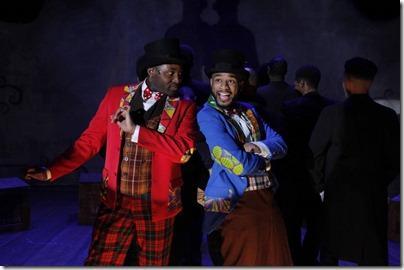
Roberson's cast is up to the challenges the material presents. Goode, as noted, channels the music of the spheres. As Clarence Norris, Stephen Allen Jr.simmers with barely contained righteous rage and his voice commands attention as it thunders over the audience at the onset of "Commencing in Chattanooga."
James Earl Jones II's unbowed Haywood Patterson turns the song "Nothin' " into a fist of knives (barely) disguised by grinning, cooning subservience. Leading the charge on "Better Make Friends With the Truth," Jones and the ensemble create a blazing musical commentary on a country where the practice of spewing "alternative facts" is actually nothing new. Yando's silver-tongued Interlocutor is a villain whose off-handed evil comes dressed in a crocodile smile and a suave silk suit.
Individually, the fates of the Scottsboro nine are a daring commentary on society. The fact that they are remembered, however, leaves room for a sliver of hope. And when The Lady whose, quiet strength has been hovering throughout their lives, makes herself known at the end of The Scottsboro Boys , that hope shines through, overpowering the despair.
The Scottsboro Boys continues through March 12th at Stage 773, 1225 W. Belmont (map), with performances Thursdays at 7:30pm, Fridays 8pm, Saturdays 4pm & 8pm, Sundays 2pm. Tickets are $38-$51, and are available by phone (773-327-5252) or online through Stage773.com (check for half-price tickets at Goldstar.com ). More information at PorchlightMusicTheatre.org. (Running time: 1 hour 50 minutes, no intermission)
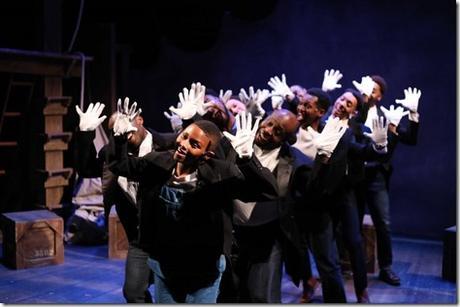
Photos by Kelsey Jorissen
Larry Yando (The Interlocutor, Judge, Governor of Alabama), Denzel Tsopnang (Mr. Bones, Sheriff, Lawyer, Guard, Attorney General, Clerk), Mark J. P. Hood (Mr. Tambo, Deputy, Lawyer, Guard, Samuel Leibowitz), Cynthia Clarey (The Lady), Travis Austin Wright (Olen Montgomery), Maurice Randle (Andy Wright), Cameron Goode (Eugene Williams, Little George), James Earl Jones II (Haywood Patterson), Stephen Allen Jr. (Clarence Norris, Preacher), Izaiah Harris (Willie Robeson, understudy Roy Wright), Trequon Tate (Ozie Powell, Ruby Bates), Jerome Riley Jr. (Roy Wright, Mr. Tambo understudy), (Charles Weems, Victoria Price), Patrick Perry , Jared Grant , Susan P. Anderson , Michael Lovette , Nolan Robinson (understudies).
Aaron Benham (conductor, piano), Reuben Garza (percussion), Kimberly Lawson (violin), Mike Matlock (reeds), Aaron Day (guitars), Ben Dillinger (upright bass).
behind the scenes
Samuel G. Roberson Jr. (director), Florence Walker-Harris (choreographer), Doug Peck (music director), Andrei Onegin (scenic design), Samantha Jones (costume design), Richard Norwood (lighting design), Keegan Bradac (sound design, sound board engineer), Mealah Heidenreich (props), (projection design), Jared Bellot (dramaturg), Jessica Forella (stage manager), Wardell Julius Clark (assistant director), Breon Arzell (associate choreographer), Alex Rhyan (production manager), Michael Weber (artistic director), Jeannie Lukow (executive director), Fatima Sowe (asst. dramaturg), Travis Austin Wright (dance captain), Izaiah Harris (tap captain), Jaq Seifert (fight choreography), Leslie Ann Sheppard (asst. fight choreography), James Earl Jones II (fight captain), Jos N. Banks (vocal captain), Johnnie Schleyer (tech director), Jacari Campbell, Matthew Nadler (asst. stage managers), Rachel West (master electrician), Amanda Ziegler (asst. sound design), Shane Cinal (scenic artist), Shelby Brand (wardrobe supervisor), Jared Grant (child supervisor), Kelsey Jorissen (photographs)
Tags: 17-0224, Aaron Benham, Aaron Day, Alex Rhyan, Amanda Ziegler, Andrei Onegin, Ben Dillinger, Breon Arzell, Catey Sullivan, Chicago musical theater, Chicago Theater, Cynthia Clarey, David Thompson, Denzel Tsopnang, Doug Peck, Fatima Sowe, Florence Walker-Harris, Fred Kander, Izaiah Harris, Jacari Campbell, James Earl Jones II, Jaq Seifert, Jared Bellot, Jared Grant, Jeannie Lukow, Jerome Riley Jr., Jessica Forella, John Ebb, Johnnie Schleyer, Jos N. Banks, Kander & Ebb, Keegan Bradac, Kelsey Jorissen, Kimberly Lawson, Larry Yando, Leslie Ann Sheppard, Mark J.P. Hood, Matthew Nadler, Maurice Randle, Maurice Randle Jr., Mealah Heidenreich, Michael Lovette, Michael Weber, Mike Matlock, Nolan Robinson, Patrick Perry, Porchlight Music Theatre, post, Rachel West, Reuben Garza, Richard Norwood, Ross Hoppe, Samantha Jones, Samuel G. Roberson, Samuel G. Roberson Jr., Shane Cinal, Shelby Brand, Stage 773, Stephen Allen Jr., Susan P. Anderson, Travis Austin Wright, Trequon Tate, Wardell Julius Clark
Category: 2017 Reviews, Catey Sullivan, Kander and Ebb, Musical, Porchlight Music Theatre, Stage 773

